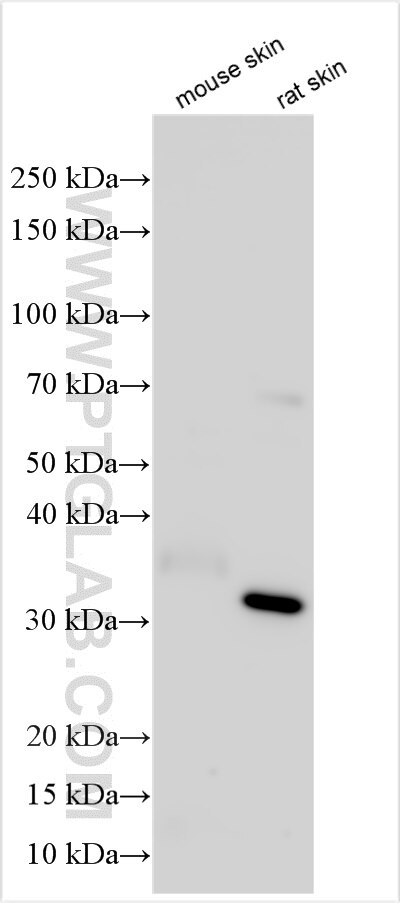Caspase 14 Polyklonaler Antikörper
Caspase 14 Polyklonal Antikörper für WB, Indirect ELISA
Wirt / Isotyp
Kaninchen / IgG
Getestete Reaktivität
human, Maus, Ratte
Anwendung
WB, Indirect ELISA
Konjugation
Unkonjugiert
Kat-Nr. : 28136-1-PBS
Synonyme
Geprüfte Anwendungen
Produktinformation
28136-1-PBS bindet in WB, Indirect ELISA Caspase 14 und zeigt Reaktivität mit human, Maus, Ratten
| Getestete Reaktivität | human, Maus, Ratte |
| Wirt / Isotyp | Kaninchen / IgG |
| Klonalität | Polyklonal |
| Typ | Antikörper |
| Immunogen | Caspase 14 fusion protein Ag27242 |
| Vollständiger Name | caspase 14, apoptosis-related cysteine peptidase |
| Berechnetes Molekulargewicht | 242 aa, 28 kDa |
| Beobachtetes Molekulargewicht | 35 kDa |
| GenBank-Zugangsnummer | BC069541 |
| Gene symbol | CASP14 |
| Gene ID (NCBI) | 23581 |
| Konjugation | Unkonjugiert |
| Form | Liquid |
| Reinigungsmethode | Antigen-Affinitätsreinigung |
| Lagerungspuffer | PBS only |
| Lagerungsbedingungen | Store at -80°C. 20ul Größen enthalten 0,1% BSA. |
Hintergrundinformationen
Caspase14 belongs to the caspase family of cysteinyl aspartate-specific proteinases that frequently play a central role in apoptosis. Caspase14 exist as inactive proenzymes that undergo proteolytic processing to produce large and small subunits (p20 and p10) at Ile152/Lys153 residues, which is different to other caspases (Asp residue). Caspase14 plays a role in protein maturation of filaggrin, and possibly in DNA repair. Overexpression of Caspase14 has been detected in several of epithelial malignancies, indicating that Caspase14 could play a role in carcinogenesis and disease progression of cancers. Caspase14 can binds the apoptosis-inducing factor (AIF) indicating that caspase14 may be an anti-apoptotic protein. In the LADC specimens, two bands can be detected with MW of 35 kDa and 37 kDa which represent Caspase14 and the phosphorylated Caspase14(pCasp-14) respectively. (PMID:21567094, 12200134, 10203698, 17515931, 16061209). This antibody can recognise all the forms of Caspase14.



